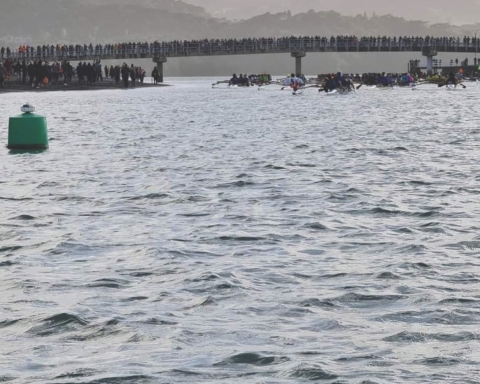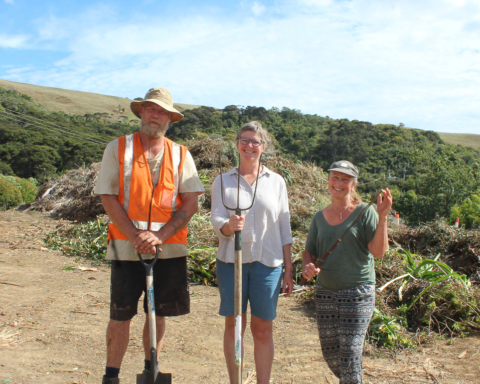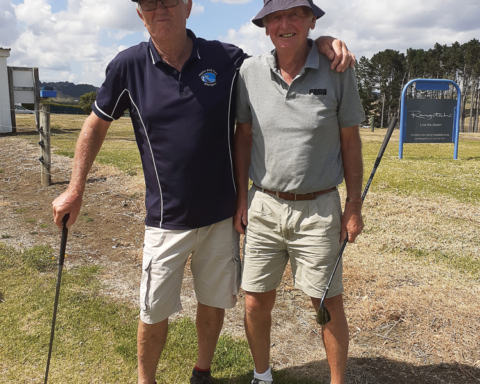Marty Davies needs a bit of prompting by his wife, Janet when asked if he will miss work.
“Oh no! I don’t think so,” he says emphatically, but then is made to reconsider his answer by his better half.
There are a lot of nice people, yes, he has to agree, and he will miss them.
“There’re still a few oldies around that come in and give me a bit of stick,” he says of the loyal customers who he’s known forever and a day.
The 67-year-old – “going on 68” – Raglan “local” retired on Friday from working at the supermarket where he has put in some 30 years in his lifetime, first starting back in the day as a 10-year-old with an afterschool job when the place was called Petchells. His mother, Fay, worked there, and later too did his sisters, Gina Robbs – who’s still there – and Fiona Waitere.
On Friday he got the $200 petrol voucher pressie, had a nice lunch, then walked straight out the door headed to the Coromandel, Smuggler’s Cove, where he has a permanent caravan on a share in a 330-acre piece of land, “right on the water”.
The fishing was OK, he says on Tuesday, “Got a feed, nothing fantastic … painted the caravan”. Welcome to retirement!
Retirement was because, “well, you know, you just gotta start enjoying some time down the line”.
Of course it’s good to earn money but “you don’t know what is around the corner”, says Marty, who buried a mate a couple of weeks ago, cancer, and it wasn’t long after the prognosis.
He and Janet – who works part-time as a caregiver for Healthcare NZ – have a month-long jaunt of the South Island planned from the end of February, in a wee campervan they bought about 12 months ago.
The two reconnected in later life, in this century – they have seven children and nine grandchildren between them – after working together at Petchells in the 1960s.
“We used to work together at the supermarket when we were 16 years old, says Janet, who was the checkout chick and had also worked the haberdashery department that was part of the store.
They dated for about 18 months.
“And she buggered off to Australia,” says Marty, who ended up doing a Foodstuffs scholarship that led to his own supermarket in Frankton, Hamilton, The Self Help, which he later sold when his marriage split up; for “departure tax” reasons, he calls it.
Marty went into real estate for a little while, “when the interest rates were 20 per cent, hence I didn’t sell anything”, then managed produce for Foodtown in Hamilton central and Nawton, and was 2IC for produce in Chartwell, before returning to Raglan about 15 years ago, after some 20 years in the big smoke, because SuperValue’s previous owner “wanted someone to run the produce”.
He built it up from a little area no bigger than half his kitchen bench to what it is today.
His favourite memories of working in the Raglan supermarket were of the good old Petchells days, when there was only the pub and the club and “you knew every customer by name”.
“In those days, but not any more – so many tourists, so many people in town, many internationals…
“In the good old days I used to ring the farmers up and ask them for their orders twice a week. When I got a bit older I used to deliver to them.”
Deliveries were made to order, they had to “weigh everything up”. Things like sugar and flour came in a sack.
“You had to add, you didn’t have a calculator”, and it was often pages of stock orders.
“Nana Petchell would always check them and give you a ticking off if you got it wrong.
“The ‘early days’ was good, the ships used to come in from overseas.”
Mainly from Australia, bringing in roofing iron, but also tins of biscuits from the South Island. Pig meal, poultry and pellets came by ship, too, and went to Hamilton first.
“We were making up big orders and bringing it to them: they want 30 dozen eggs, five sacks of spuds, 20kg frozen peas.”
You could say Raglan has gone backwards, Marty says. Back then the town had a drapery store, shoe shops, three grocery stores, two butchers; there were even general stores in Te Mata and Te Uku.
The wharf was in production, which meant there was a lot of employment, and business was local before fast cars meant people could shoot to the city for more choice.
There may have been plenty of changes since Marty’s early years in Raglan but he plans to stick around to enjoy his retirement. He, too, has the choice of jumping in a fast car and going wherever he wants.
Inger Vos






